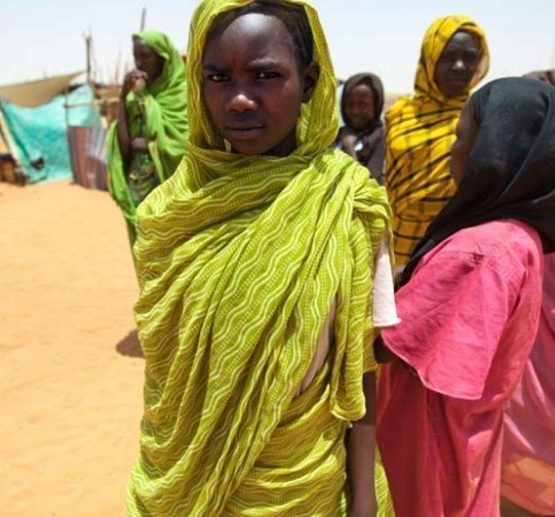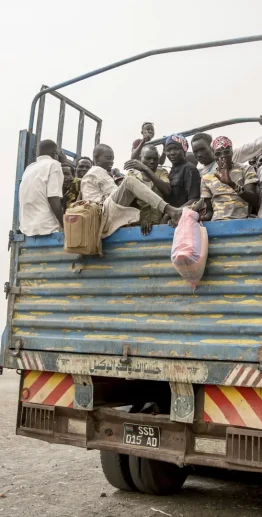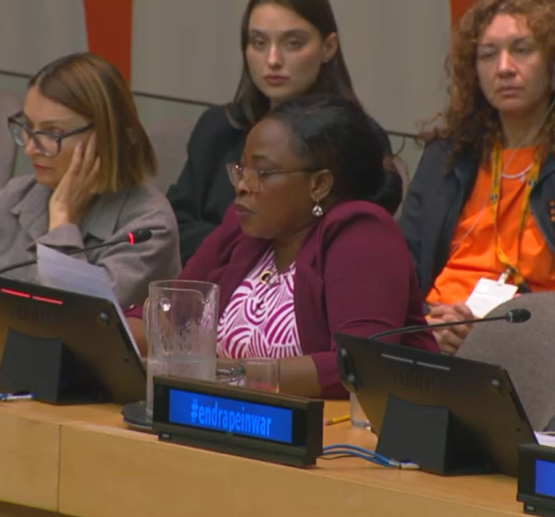18 October – Statement by Niemat Ahmadi on War Against Women and the Quest for Peace and Security in Sudan
Good afternoon: I am exceedingly delighted to have this opportunity to address your excellencies today to bring to your attention not only the horrifying reality of the lives of women in Sudan, but also the resilience of Sudanese women, men, and children who have endured unimaginable horror and yet continue to rise.
In conjunction with the Security Council Open Debate on Women, Peace and Security next week – there has never been a better time to address the alarming constraints to realizing women, peace and security in Sudan.
The vicious war that erupted on April 15th in Sudan has been largely fought over women’s bodies, and I don’t think this is news to this Council. As I speak to you today, Sudanese women endure unspeakable suffering and are left alone to fend for themselves.
You are all too familiar with the fact that in Sudan, rape has been used as a weapon of war, death, and destruction, and women have been adversely impacted and left to suffer in silence for over two decades. The genocide in Darfur that started 20 years ago has yet to be resolved, and those who have been forced to flee still remain in makeshift camps to this day and are fearful to return home because their attackers have not been apprehended or held accountable. In these camps, women and children make up the overwhelming majority of those living as IDPs inside Darfur and refugee camps, which make up about 80-85%.
The victimization of women has been well documented and, sadly, has been allowed to go on for far too long. During longstanding genocidal attacks in Darfur, year after year, women have been systematically targeted for rape, humiliation, and degrading treatment in a calculated strategy to strip away their dignity and break the will of their families and their society.
Women represent at least 50% of any nation’s population, talent, and human resources- even more so during times of war when resources are scarce and drained to the limit. No society can afford to sideline half its population and expect to thrive. In Sudan today, women are not only sidelined, but it has become the most dangerous place to be a woman!
In the text of the arrest warrant for former president Al-Bashir, the ICC has cited that rape in Darfur has been a tool of genocide. We were pleased by the recognition of this heinous crime as it was a step toward finally addressing this deadly phenomenon and stopping it. Nonetheless, the impunity for Al-Bashir, the man who masterminded the Darfur genocide and the attacks on women, has made it nearly impossible for women to have the opportunity to tell their stories in a court of justice to restore their dignity – because he is at large as fugitive – and continues to undermine the authority of this esteemed Security Council.
Ladies and gentlemen, the women of Sudan, despite their unmatched resilience, have been let down time and time again by the very institutions they looked up to for peace, security, protection, and justice.
In Darfur, women, despite their long suffering, have demonstrated outstanding leadership, courage, and resolve – taking charge in addressing their issues and communities, serving as spokespersons, healing their communities, and fighting for their rights. Regrettably, actors and stakeholders working to resolve the crises in Darfur have utterly failed to recognize or invest in these unique qualities demonstrated by women and have constantly excluded and deprived women from being at the table to take their rightful place. This makes the junta in Sudan believe falsely that Sudanese women have no value.
As you all witnessed in 2019, the unprecedented movement for peaceful change that toppled 30 years of dictatorship in Sudan was largely led, supported, and fueled by women. Again, despite their unwavering commitment and leadership in the movement for change, during the short-lived interim period, the government continued to exclude women; there were only two women serving the sovereign council, two in the cabinet of ministers, and one state governor out of Sudan’s 16 states.
When women protested, they were told a half-truth – that they must give the chance to peace. What kind of peace would the Sudanese society have achieved without the women of Sudan and expect it to succeed?
And now, during this vicious war, when international diplomats, international aid agencies, and non-Sudanese have been evacuated while the generals are waging war against the people of Sudan, it is the women, men, and youth of Sudan who have stepped in at greater risk to their lives, who have risen beyond their circumstances – shouldering the effort of emergency response, providing aid for the wounded, transporting those with chronic diseases, documenting atrocities, and providing burial services to the uncounted dead bodies scattering in the streets of Khartoum and across the cities of Darfur.
Today, Sudan doesn’t have a functioning government in over 80% of its territories, but the women and youth of Sudan are the ones who are governing – you can disagree with me, but I would challenge you. Governing to me means attending to the basic needs of your society and providing protection and safety nets for the citizens.
And again, when the Jeddah negotiation for ceasefire started, we expected that women would be included from the start – not because they are carrying arms, but because they are the ones who are bearing the brunt of the crises while providing life-saving aid and monitoring the situation on the ground, alerting civilians to stay home or follow the safety route.
Your Excellencies, despite the challenges I would like to recognize the UN Security Council’s effort to advance women, peace and security in conflict settings; however, I believe there is a need for a paradigm shift in our approaches. It has been two decades since Resolution 1325 was adopted, followed by Resolutions 1820 and 1888, to advance the women, peace and security agenda and to prevent sexual and gender-based violence in war zones, respectively. While there has been progress in many situations, the promise of these great instruments has not fully materialized in places like Sudan, particularly at the grassroots level.
These instruments can be effective in the post-conflict setting, but in the midst of war, we need to use other tools that the Security Council has at its disposal to create an enabling environment for these instruments to be enacted. Peace and security for women in Sudan means protection and justice. It has been 6 months, and we have yet to see any sign that the warring parties in Sudan will back down.
To realize women, peace and security in Sudan we need three things right now: A robust intervention to protect civilians and protect the humanitarian actors to save lives, then accountability for those most responsible must be a priority – these two steps will pave the way for true peace.
Sudan needs a gender-sensitive atrocity prevention approach that starts with civilian protection, protection of human rights and accountability. Inclusion and participation of women at all levels of decision-making is of paramount importance, reinforced by resources, capacity, and technology to bring the dream of peace and security in Sudan into reality. Today millions of Sudanese civilians and I look up to you and hope you will not let the women and the people of Sudan down again.
Thank you!
Niemat Ahmadi, President and Founder
Darfur Women Action Group
DWAG promises not to share it with any others nor will we use it for any purposes other than sending updates about the situation in Darfur, Sudan, and updates on any DWAG activities.
By submitting this form, you are consenting to receive marketing emails from: . You can revoke your consent to receive emails at any time by using the SafeUnsubscribe® link, found at the bottom of every email. Emails are serviced by Constant Contact
DWAG promises not to share it with any others nor will we use it for any purposes other than sending updates about the situation in Darfur, Sudan, and updates on any DWAG activities.
By submitting this form, you are consenting to receive marketing emails from: . You can revoke your consent to receive emails at any time by using the SafeUnsubscribe® link, found at the bottom of every email. Emails are serviced by Constant Contact
Latest Features and News
Latest Headlines
Sudanese seek refuge underground in besieged Darfur city
March 15 - 2025
Sudan facing ‘the abyss’ unless war ends as…
March 13 - 2025
+ Read MoreLatest Headlines
Sudan war: Children facing ‘unimaginable suffering’, warns UNICEF…
March 13 - 2025
MSF pulls out of famine-stricken camp in Sudan’s…
February 24 - 2025
+ Read More


